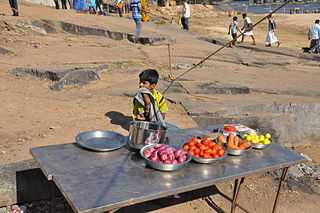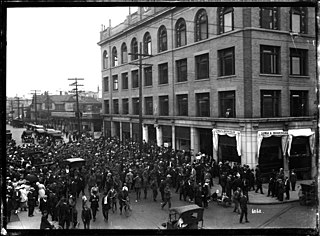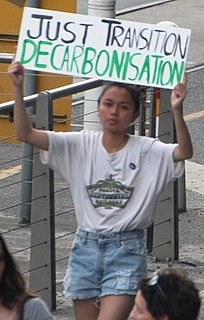Related Research Articles

The International Labour Organization (ILO) is a United Nations agency whose mandate is to advance social and economic justice through setting international labour standards. Founded in October 1919 under the League of Nations, it is the first and oldest specialised agency of the UN. The ILO has 187 member states: 186 out of 193 UN member states plus the Cook Islands. It is headquartered in Geneva, Switzerland, with around 40 field offices around the world, and employs some 2,700 staff from over 150 nations, of whom 900 work in technical cooperation programmes and projects.
Labour law mediates the relationship between workers, employing entities, trade unions and the government. Collective labour law relates to the tripartite relationship between employee, employer and union. Individual labour law concerns employees' rights at work also through the contract for work. Employment standards are social norms for the minimum socially acceptable conditions under which employees or contractors are allowed to work. Government agencies enforce labour law.

A multinational company (MNC) is a corporate organization that owns or controls production of goods or services in at least one country other than its home country. Black's Law Dictionary suggests that a company or group should be considered a multinational corporation if it derives 25% or more of its revenue from out-of-home-country operations. However, a firm that owns and controls 51% of a foreign subsidiary also controls production of goods or services in at least one country other than its home country and therefore would also meet the criterion, even if that foreign affiliate generates only a few percent of its revenue. A multinational corporation can also be referred to as a multinational enterprise (MNE), a transnational enterprise (TNE), a transnational corporation (TNC), an international corporation, or a stateless corporation. There are subtle but real differences between these terms.
Labor rights or workers' rights are both legal rights and human rights relating to labor relations between workers and employers. These rights are codified in national and international labor and employment law. In general, these rights influence working conditions in relations of employment. One of the most prominent is the right to freedom of association, otherwise known as the right to organize. Workers organized in trade unions exercise the right to collective bargaining to improve working conditions.

The International Transport Workers' Federation (ITF) is a democratic global union federation of transport workers' trade unions, founded in 1896. In 2017 the ITF had 677 member organizations in 149 countries, representing a combined membership of 19.7 million transport workers in all industrial transport sectors: civil aviation, dockers, inland navigation, seafarers, road transport, railways, fisheries, urban transport and tourism. The ITF represents the interests of transport workers' unions in bodies that take decisions affecting jobs, employment conditions or safety in the transport industry.
The Multilateral Agreement on Investment (MAI) was a draft agreement negotiated in secret between members of the Organisation for Economic Co-operation and Development (OECD) between 1995 and 1998. It sought to establish a new body of universal investment laws that would grant corporations unconditional rights to engage in financial operations around the world, without any regard to national laws and citizens' rights. The draft gave corporations a right to sue governments if national health, labor or environment legislation threatened their interests. When its draft became public in 1997, it drew widespread criticism from civil society groups and developing countries, particularly over the possibility that the agreement would make it difficult to regulate foreign investors. After an intense global campaign was waged against the MAI by the treaty's critics, the host nation France announced in October 1998 that it would not support the agreement, effectively preventing its adoption due to the OECD's consensus procedures.

Decent work is employment that "respects the fundamental rights of the human person as well as the rights of workers in terms of conditions of work safety and remuneration. ... respect for the physical and mental integrity of the worker in the exercise of his/her employment."
The Right to Organise and Collective Bargaining Convention (1949) No 98 is an International Labour Organization Convention. It is one of eight ILO fundamental conventions.

The Global Reporting Initiative is an international independent standards organization that helps businesses, governments and other organizations understand and communicate their impacts on issues such as climate change, human rights and corruption.

The term ethical trade first gained currency in the mid-1990s, where it was used as a term for socially responsible sourcing. Ethical trade addresses the ethical aspects of organisations including worker welfare, agricultural practice, natural resource conservation, and sustainability of the environment. Since then, numerous multinational organisations have adopted ethical trade policies by outsourcing to auditing companies to monitor the conditions of workers in their supply chains. The leading alliance of these companies, trade unions and non-governmental organisations is the Ethical Trading Initiative. to support business
Migrant domestic workers are, according to the International Labour Organization’s Convention No. 189 and the International Organization for Migration, any persons "moving to another country or region to better their material or social conditions and improve the prospect for themselves or their family," engaged in a work relationship performing "in or for a household or households." Domestic work itself can cover a "wide range of tasks and services that vary from country to country and that can be different depending on the age, gender, ethnic background and migration status of the workers concerned." These particular workers have been identified by some academics as situated within "the rapid growth of paid domestic labor, the feminization of transnational migration, and the development of new public spheres." Prominent discussions on the topic include the status of these workers, reasons behind the pursue in this labour, recruitment and employment practices in the field, and various measures being undertaken to change the conditions of domestic work among migrants.

Labor relations is a field of study that can have different meanings depending on the context in which it is used. In an international context, it is a subfield of labor history that studies the human relations with regard to work – in its broadest sense – and how this connects to questions of social inequality. It explicitly encompasses unregulated, historical, and non-Western forms of labor. Here, labor relations define "for or with whom one works and under what rules. These rules determine the type of work, type and amount of remuneration, working hours, degrees of physical and psychological strain, as well as the degree of freedom and autonomy associated with the work."
Tripartism is economic corporatism based on tripartite contracts between employers' organizations, trade unions, and the government of a country. Each is to act as a social partner to create economic policy through cooperation, consultation, negotiation, and compromise. Tripartism is a common form of and favored by neo-corporatism.

Ebrahim Patel is a South African cabinet minister, who holds the position of Minister of Trade, Industry and Competition. He previously served as Minister of Economic Development from 2009 to 2019.

Just Transition is a framework developed by the trade union movement to encompass a range of social interventions needed to secure workers' rights and livelihoods when economies are shifting to sustainable production, primarily combating climate change and protecting biodiversity. It has been endorsed internationally by governments in different arenas, including the International Labour Organization (ILO), the United Nations Framework Convention on Climate Change (UNFCCC) in the Paris Agreement, and the Katowice Climate Conference (COP24) and the European Union.
The United Nations Global Initiative to Fight Human Trafficking (UN.GIFT) is a multi-stakeholder initiative providing global access to expertise, knowledge and innovative partnerships to combat human trafficking.

IndustriALL Global Union is a global union federation, founded in Copenhagen on 19 June 2012.
International labour law is the body of rules spanning public and private international law which concern the rights and duties of employees, employers, trade unions and governments in regulating the workplace. The International Labour Organization and the World Trade Organization have been the main international bodies involved in reforming labour markets. The International Monetary Fund and the World Bank have indirectly driven changes in labour policy by demanding structural adjustment conditions for receiving loans or grants. Issues regarding Conflict of laws arise, determined by national courts, when people work in more than one country, and supra-national bodies, particularly in the law of the European Union, has a growing body of rules regarding labour rights.
The Accord on Fire and Building Safety in Bangladesh was signed on 15 May 2013. It is a five-year independent, legally binding agreement between global brands and retailers and trade unions designed to build a safe and healthy Bangladeshi Ready Made Garment (RMG) Industry. The agreement was created in the immediate aftermath of the Rana Plaza building collapse that led to the death of more than 1100 people and injured more than 2000. In June 2013, an implementation plan was agreed leading to the incorporation of the Bangladesh Accord Foundation in the Netherlands in October 2013.
Heribert Maier was an Austrian trade union leader.
References
- ↑ "International Framework Agreement". Eurofound . December 20, 2019. Retrieved 2021-02-21.
- ↑ "List of all identified transnational company agreements". European Commission / International Labour Organisation. Retrieved 27 February 2019.